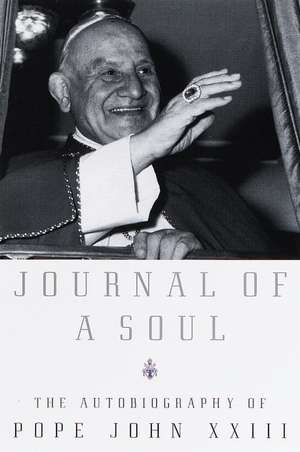Journal of a Soul: The Autobiography of Pope John XXIII
Autor Pope XXIII John, Pope John XXIIIen Limba Engleză Paperback – 31 oct 1999
This Image Books edition features a biographical portrait of Pope John by his personal secretary, Monsignor Loris Capovilla. It also includes several of his most moving prayers, sixty brief thoughts and aphorisms, his "Rules for the Ascetic Life," many of his letters, even his last will and testament. Christians everywhere will welcome the reissue of "one of the most original, interesting, and inspiring revelations of intimate personal experiences ever written," which "ranks well with the classic spiritual autobiographies" (Critic).
Journal of a Soul, the first ever such work from a Roman pontiff, opens new windows onto the soul of the man himself.
| Toate formatele și edițiile | Preț | Express |
|---|---|---|
| Paperback (2) | 134.19 lei 3-5 săpt. | |
| IMAGE – 31 oct 1999 | 134.19 lei 3-5 săpt. | |
| Bloomsbury Academic – sep 2000 | 252.71 lei 6-8 săpt. |
Preț: 134.19 lei
Nou
Puncte Express: 201
Preț estimativ în valută:
25.68€ • 26.76$ • 21.26£
25.68€ • 26.76$ • 21.26£
Carte disponibilă
Livrare economică 13-27 martie
Preluare comenzi: 021 569.72.76
Specificații
ISBN-13: 9780385497541
ISBN-10: 0385497547
Pagini: 544
Dimensiuni: 152 x 226 x 36 mm
Greutate: 0.73 kg
Ediția:Rev W/New Intro.
Editura: IMAGE
ISBN-10: 0385497547
Pagini: 544
Dimensiuni: 152 x 226 x 36 mm
Greutate: 0.73 kg
Ediția:Rev W/New Intro.
Editura: IMAGE
Notă biografică
Among his many accomplishments and triumphs, Pope John XXIII (1881-1963) is celebrated for convening the Second Vatican Council, commonly regarded as the most important event in religious history since the Protestant Reformation of the sixteenth century.
Extras
1896: Resolutions made during the Spiritual Exercises of 1896 and confirmed in 1897 and 1898
Ad majorem Dei gloriam.1
(1) I resolve and promise never to approach the holy sacraments out of mere habit or with indifference, and never to spend less than a quarter of an hour in my preparation.
(2) I resolve moreover to persevere every day, and especially in the holidays, in my meditation, in general and particular examinations of conscience, in saying the rosary, in spiritual reading and in visits to the Blessed Sacrament, and in saying the other prayers usually recited in the seminary, and to do all this with great devotion and according to my time-table, which I promise to keep as faithfully as possible, both in the seminary and during the holidays.
(3) When I am told to do so I will also recite in honour of Mary most holy the Psalter2 and the five Psalms, and also three Hail Marys for holy purity every day.
(4) I will watch myself most carefully, trying not to succumb to distractions during prayers, and especially during meditation, during the five Our Fathers after dinner, during Vespers and the recitation of the rosary. To this end, both when I am praying and at all other times, I will imagine myself in the presence of Jesus and with him on some occasion of his life, at the Last Supper, or on Calvary, etc.
(5) Above all, I will watch myself carefully, lest the tree of pride should grow in me; I will beware of this, keeping myself humble-minded and the lowliest of all, both in pious practices and in study.
(6) As regards my studies, I will apply myself to them with love and enthusiasm to the best of my powers, taking care to give due attention to all subjects without any distinction, never proffering the excuse that I do not like any of them.
My sole object in studying wil1 be to work for the greater glory of God, the honour of the Church, the salvation of souls, and not for my own honour, not in order to be cleverer than all the others--and I will always remind myself that God will ask me to render an account of that talent also which I have wasted in merely acquiring glory for myself.
(7) I will make a special effort to mortify myself, above all and at all times chastising my self-love, my besetting sin, avoiding all occasions which might foster it. Therefore I will not try to display my learning in conversation, I will never find excuses for any of my actions; indeed, I will consider the behaviour of others as always better than my own. I will not use phrases or words which give me an air of superiority, I will shun all praise, and will be most careful to curb my desire to show off, to hold people's attention or to attach any importance to myself.
(8) I will give myself no rest until I have acquired a great love and devotion to the Blessed Sacrament, which will always be the dearest object of my affections and my thoughts, indeed of my whole life as a seminarist and, if God so chooses, as a priest.
(9) I promise and I vow to Our Lady, who will always be my dearest Mother, to guard myself most scrupulously as far as lies in my power from any thought or act to which I might give consent, which might cast so much as a shadow over the heavenly virtue of holy purity. With this end in view I now and always invoke this Queen of Virgins, in order that she may help me to keep far from me the temptations which the devil will prepare to weaken my resolve.
(10) The devotion to the Sacred Heart in the Blessed Sacrament, which I must first of all show in my own behaviour, I will try to impart to others, especially to children, taking pleasure in speaking of this devotion, and I will do the same concerning devotion to Our Lady.
(11) I will never be unmindful of St Joseph, and will say some prayers to him every day for myself, for the dying and for the Church.
(12) During the Novenas3 in the months of March, May, June and October, and at all times, I will try to mortify my own feelings, denying my appetites what they desire, and in the holidays, especially where there are people present, I will pay special attention to modesty, not so much in order to be an example to others as to avoid those occasions that might perhaps be harmful to me.
(13) I myself will pray and will encourage others to pray to the Blessed Sacrament, to the Virgin and the saints, for the conversion of the East and, above all, for the return of the dissident Churches. I will never forget to pray for the Supreme Pontiff for the triumph of the Church, for my own beloved Bishop, for my relations and benefactors, and especially for those to whom I owe most.
(14) To sum up, I will so behave that all my doings may be in accordance with the oft-repeated maxim of St Ignatius Loyola: 'To the greater glory of God.'
l. 'To the greater glory of God': St Gregory the Great, Dialogues, I, II (P.L., LXXVII, 160). Cf. also Exerdtia spiritualia Sancti Ignatii de Loyala et eorum Directoria (Monumenta Ignatiana, series secunda), Matriti 1919, p. 897.
2. The Psalter (Salterio) referred to here would seem to be either the small book containing various psalms, which Italian children were given as a reading book, or Our Lady's Psalter.
3. Nine days' prayer in preparation for the great feasts of the Church's year.
1897: Of holy purity
Through the grace of God and the intercession of my Mother, Mary most holy, 1 am convinced of the inestimable worth of holy purity and of my own very great need of it, called as I am to the angelic ministry of the priesthood. In order to preserve this shining mirror free from all stain, I have in these holy Exercises, with the approval of my Spiritual Father, written down the following resolutions, which I desire to keep most scrupulously. I offer them to the Virgin of Virgins by the hands of those three angelic youths, Aloysius Gonzaga, Stanislaus Kostka and John Berchmans, my special protectors,1 so that she, through the merits of these three lilies of chastity, so precious in her sight, may deign to bless these resolves and grant me the grace to put them into practice.
(1) First of all, I am profoundly convinced that holy purity comes as a grace from God, and that without this grace I am incapable of it, and so in this matter I will start on the sure foundation of humility, distrusting myself and placing all my confidence in God and most holy Mary. Therefore every day I will pray to the Lord for the virtue of holy purity, and I will pray to him with particular fervour at holy communion, since it is in the Eucharist that he offers me the 'grain that shall make the young men flourish, and new wine the maidens'.2 I will have a tender love for the Queen of Virgins. I will always offer the Hour of Prime of the Little Office,3 the first Hail Mary of the Angelus and the first decade of the rosary for the acquiring and preserving of holy purity. I will also ask Joseph, Mary's most chaste spouse, to help me, addressing to him twice a day the prayer 'O Guardian of Virgins',4 and I will cultivate a devotion to the three saintly youths I have mentioned, whose purity I will try to copy in my own life.
(2) I will take pains to mortify my own feelings severely, keeping them within the bounds of Christian modesty; to this end I will set a special guard on my eyes, which St Ambrose called 'deceitful snares'5 and St Anthony of Padua 'thieves of the soul',6 avoiding, as far as possible, large gatherings of people for feasts, etc., and when I am obliged to be present on these occasions I will make quite sure that nothing that even suggests the sin against holy purity may offend my eyes: on such occasion they shall remain downcast.
(3) I will also take care to behave with the greatest decorum when I am passing through towns or other places full of people, never looking at posters or illustrations, or shops which might contain indecent objects, bearing in mind the words of Ecclesiasticus: 'Do not look around in the streets of a city; nor wander about in its deserted sections.'7
And even in the churches, besides behaving with edifying decorum during the sacred functions, I will never gaze at beautiful things of any sort, such as pictures, carvings, statues or other objects of art which, however slightly, offend against propriety, and particularly where paintings are concerned.
(4) With women of whatever station in life, even if they are related to me or are holy women, I will be particularly cautious, avoiding their familiarity, company or conversation, especially if they are young women. Nor will I ever fix my eyes on their faces, mindful of what the Holy Spirit teaches us: 'Do not look intently at a virgin, lest you stumble and incur penalties for her.'8 So I will never confide in them in any way, but when I have to speak with them I will see that my speech is 'dry, brief, prudent and correct'.
(5) I will never hold in my hands or look at books containing frivolities or immodest pictures, and if I find any of these dangerous objects, even in my companions' hands, I will tear them up or bum them, unless by so doing a graver scandal should ensue.
(6) Besides giving an example of perfect modesty in my own speech, I must also, when with my family, try to keep the conversation free from subjects ill-befitting holy purity, never allowing anyone, especially in my presence, to speak of love-making or use any coarse or indecent words or sing love songs. I will always gently rebuke any immodesty on the part of others, and if they should persist I will go right away from them, showing my deep displeasure. In the seminary I will be most careful in this respect and on my guard to prevent any demonstrativeness or particular friendships among my companions, and all those acts and words which, though acceptable in the world, are unbecoming for clerics.
(7) At table, whether speaking or eating, I will never be greedy or immoderate; I will always find an opportunity for a little mortification; as regards the drinking of wine I will be more than moderate, because in wine lies the same danger as in women: 'Wine and women lead intelligent men astray.'9
(8) I will likewise observe the greatest modesty with regard to my own body at all times and in every movement of my eyes, hands and mind, etc., both in public and in private. To this end, then, and to remove any occasion for these movements, however innocent, at night before falling asleep I will place the rosary of the Blessed Virgin around my neck, fold my arms crosswise on my breast, and see that I find myself still lying in this position in the morning.
(9) In everything I will always remember that I must be as pure as an angel, and I will so bear myself that in everything about me, in my eyes, words and actions, may be seen that holy modesty shown in the highest degree by Saints Aloysius, Stanislaus and John Berchmans, a modesty that is pleasing, that commands reverence and is the expression of a chaste heart and soul, beloved of God.
(10) I will not forget that I am never alone, even when I am by myself: God, Mary and my Guardian Angel see me; and I am always a seminarist.
When I am in danger of sinning against holy purity, then more urgently
than ever will I appeal to God, to my Guardian Angel and to Mary, with my familiar invocation: 'Mary Immaculate, help me.' Then I will
drink of the scourging of Jesus Christ and of the Four Last Things, mindful of the Holy Spirit's words: 'In all you do remember the end of your life, and then you will never sin.'.10
1. In this Journal there frequently occur the names of the saints Aloysius, Stanislaus, and John Berchmans, who were all born within a few years of each other, followed each other into the Society of Jesus and resembled each other in their edifying deaths. All three were canonized. By their example of ready obedience to the divine call they showed the young people of their own and later generations how to follow a 'Little Way' in the heroic exercise of virtue, of purity and holiness of life. Aloysius Gonzaga, born at Castiglione delle Stiviere in 1568, died in Rome in 1591. He entered the Society of Jesus in 1585. He was beatified in 1605 and canonized in 1726. He was proclaimed patron saint of youth in 1729. Stanislaus Kostka, born at Rostkoff, Prasnysz, Poland, in 1550, died in Rome in 1568. He entered the Society of Jesus in 1567, was beatified in 1660 and canonized in 1726. John Berchmans, born at Diest, Brabant, in 1599, died in Rome in 1621. He entered the Society of Jesus in 1616; he was beatified in 1865 and canonized in 1888.
2. Zech. 9:I7.
3. The Little Office of Our Lady.
4. Prayer to St Joseph, 'O virginia custos' (Pope Pius IX), 4 February, 1877.
5. Cf. De Poenitentia, I, 14, 73 (CSEL, LXXIII, VII, 153).
6. Cf. Sermo II in Dominica II Quadragesimae.
7. Ecclus. 9:7.
8. Ecclus. 9:5.
9. Ecclus. 19:2.
10. Ecclus. 7:43.
Ad majorem Dei gloriam.1
(1) I resolve and promise never to approach the holy sacraments out of mere habit or with indifference, and never to spend less than a quarter of an hour in my preparation.
(2) I resolve moreover to persevere every day, and especially in the holidays, in my meditation, in general and particular examinations of conscience, in saying the rosary, in spiritual reading and in visits to the Blessed Sacrament, and in saying the other prayers usually recited in the seminary, and to do all this with great devotion and according to my time-table, which I promise to keep as faithfully as possible, both in the seminary and during the holidays.
(3) When I am told to do so I will also recite in honour of Mary most holy the Psalter2 and the five Psalms, and also three Hail Marys for holy purity every day.
(4) I will watch myself most carefully, trying not to succumb to distractions during prayers, and especially during meditation, during the five Our Fathers after dinner, during Vespers and the recitation of the rosary. To this end, both when I am praying and at all other times, I will imagine myself in the presence of Jesus and with him on some occasion of his life, at the Last Supper, or on Calvary, etc.
(5) Above all, I will watch myself carefully, lest the tree of pride should grow in me; I will beware of this, keeping myself humble-minded and the lowliest of all, both in pious practices and in study.
(6) As regards my studies, I will apply myself to them with love and enthusiasm to the best of my powers, taking care to give due attention to all subjects without any distinction, never proffering the excuse that I do not like any of them.
My sole object in studying wil1 be to work for the greater glory of God, the honour of the Church, the salvation of souls, and not for my own honour, not in order to be cleverer than all the others--and I will always remind myself that God will ask me to render an account of that talent also which I have wasted in merely acquiring glory for myself.
(7) I will make a special effort to mortify myself, above all and at all times chastising my self-love, my besetting sin, avoiding all occasions which might foster it. Therefore I will not try to display my learning in conversation, I will never find excuses for any of my actions; indeed, I will consider the behaviour of others as always better than my own. I will not use phrases or words which give me an air of superiority, I will shun all praise, and will be most careful to curb my desire to show off, to hold people's attention or to attach any importance to myself.
(8) I will give myself no rest until I have acquired a great love and devotion to the Blessed Sacrament, which will always be the dearest object of my affections and my thoughts, indeed of my whole life as a seminarist and, if God so chooses, as a priest.
(9) I promise and I vow to Our Lady, who will always be my dearest Mother, to guard myself most scrupulously as far as lies in my power from any thought or act to which I might give consent, which might cast so much as a shadow over the heavenly virtue of holy purity. With this end in view I now and always invoke this Queen of Virgins, in order that she may help me to keep far from me the temptations which the devil will prepare to weaken my resolve.
(10) The devotion to the Sacred Heart in the Blessed Sacrament, which I must first of all show in my own behaviour, I will try to impart to others, especially to children, taking pleasure in speaking of this devotion, and I will do the same concerning devotion to Our Lady.
(11) I will never be unmindful of St Joseph, and will say some prayers to him every day for myself, for the dying and for the Church.
(12) During the Novenas3 in the months of March, May, June and October, and at all times, I will try to mortify my own feelings, denying my appetites what they desire, and in the holidays, especially where there are people present, I will pay special attention to modesty, not so much in order to be an example to others as to avoid those occasions that might perhaps be harmful to me.
(13) I myself will pray and will encourage others to pray to the Blessed Sacrament, to the Virgin and the saints, for the conversion of the East and, above all, for the return of the dissident Churches. I will never forget to pray for the Supreme Pontiff for the triumph of the Church, for my own beloved Bishop, for my relations and benefactors, and especially for those to whom I owe most.
(14) To sum up, I will so behave that all my doings may be in accordance with the oft-repeated maxim of St Ignatius Loyola: 'To the greater glory of God.'
l. 'To the greater glory of God': St Gregory the Great, Dialogues, I, II (P.L., LXXVII, 160). Cf. also Exerdtia spiritualia Sancti Ignatii de Loyala et eorum Directoria (Monumenta Ignatiana, series secunda), Matriti 1919, p. 897.
2. The Psalter (Salterio) referred to here would seem to be either the small book containing various psalms, which Italian children were given as a reading book, or Our Lady's Psalter.
3. Nine days' prayer in preparation for the great feasts of the Church's year.
1897: Of holy purity
Through the grace of God and the intercession of my Mother, Mary most holy, 1 am convinced of the inestimable worth of holy purity and of my own very great need of it, called as I am to the angelic ministry of the priesthood. In order to preserve this shining mirror free from all stain, I have in these holy Exercises, with the approval of my Spiritual Father, written down the following resolutions, which I desire to keep most scrupulously. I offer them to the Virgin of Virgins by the hands of those three angelic youths, Aloysius Gonzaga, Stanislaus Kostka and John Berchmans, my special protectors,1 so that she, through the merits of these three lilies of chastity, so precious in her sight, may deign to bless these resolves and grant me the grace to put them into practice.
(1) First of all, I am profoundly convinced that holy purity comes as a grace from God, and that without this grace I am incapable of it, and so in this matter I will start on the sure foundation of humility, distrusting myself and placing all my confidence in God and most holy Mary. Therefore every day I will pray to the Lord for the virtue of holy purity, and I will pray to him with particular fervour at holy communion, since it is in the Eucharist that he offers me the 'grain that shall make the young men flourish, and new wine the maidens'.2 I will have a tender love for the Queen of Virgins. I will always offer the Hour of Prime of the Little Office,3 the first Hail Mary of the Angelus and the first decade of the rosary for the acquiring and preserving of holy purity. I will also ask Joseph, Mary's most chaste spouse, to help me, addressing to him twice a day the prayer 'O Guardian of Virgins',4 and I will cultivate a devotion to the three saintly youths I have mentioned, whose purity I will try to copy in my own life.
(2) I will take pains to mortify my own feelings severely, keeping them within the bounds of Christian modesty; to this end I will set a special guard on my eyes, which St Ambrose called 'deceitful snares'5 and St Anthony of Padua 'thieves of the soul',6 avoiding, as far as possible, large gatherings of people for feasts, etc., and when I am obliged to be present on these occasions I will make quite sure that nothing that even suggests the sin against holy purity may offend my eyes: on such occasion they shall remain downcast.
(3) I will also take care to behave with the greatest decorum when I am passing through towns or other places full of people, never looking at posters or illustrations, or shops which might contain indecent objects, bearing in mind the words of Ecclesiasticus: 'Do not look around in the streets of a city; nor wander about in its deserted sections.'7
And even in the churches, besides behaving with edifying decorum during the sacred functions, I will never gaze at beautiful things of any sort, such as pictures, carvings, statues or other objects of art which, however slightly, offend against propriety, and particularly where paintings are concerned.
(4) With women of whatever station in life, even if they are related to me or are holy women, I will be particularly cautious, avoiding their familiarity, company or conversation, especially if they are young women. Nor will I ever fix my eyes on their faces, mindful of what the Holy Spirit teaches us: 'Do not look intently at a virgin, lest you stumble and incur penalties for her.'8 So I will never confide in them in any way, but when I have to speak with them I will see that my speech is 'dry, brief, prudent and correct'.
(5) I will never hold in my hands or look at books containing frivolities or immodest pictures, and if I find any of these dangerous objects, even in my companions' hands, I will tear them up or bum them, unless by so doing a graver scandal should ensue.
(6) Besides giving an example of perfect modesty in my own speech, I must also, when with my family, try to keep the conversation free from subjects ill-befitting holy purity, never allowing anyone, especially in my presence, to speak of love-making or use any coarse or indecent words or sing love songs. I will always gently rebuke any immodesty on the part of others, and if they should persist I will go right away from them, showing my deep displeasure. In the seminary I will be most careful in this respect and on my guard to prevent any demonstrativeness or particular friendships among my companions, and all those acts and words which, though acceptable in the world, are unbecoming for clerics.
(7) At table, whether speaking or eating, I will never be greedy or immoderate; I will always find an opportunity for a little mortification; as regards the drinking of wine I will be more than moderate, because in wine lies the same danger as in women: 'Wine and women lead intelligent men astray.'9
(8) I will likewise observe the greatest modesty with regard to my own body at all times and in every movement of my eyes, hands and mind, etc., both in public and in private. To this end, then, and to remove any occasion for these movements, however innocent, at night before falling asleep I will place the rosary of the Blessed Virgin around my neck, fold my arms crosswise on my breast, and see that I find myself still lying in this position in the morning.
(9) In everything I will always remember that I must be as pure as an angel, and I will so bear myself that in everything about me, in my eyes, words and actions, may be seen that holy modesty shown in the highest degree by Saints Aloysius, Stanislaus and John Berchmans, a modesty that is pleasing, that commands reverence and is the expression of a chaste heart and soul, beloved of God.
(10) I will not forget that I am never alone, even when I am by myself: God, Mary and my Guardian Angel see me; and I am always a seminarist.
When I am in danger of sinning against holy purity, then more urgently
than ever will I appeal to God, to my Guardian Angel and to Mary, with my familiar invocation: 'Mary Immaculate, help me.' Then I will
drink of the scourging of Jesus Christ and of the Four Last Things, mindful of the Holy Spirit's words: 'In all you do remember the end of your life, and then you will never sin.'.10
1. In this Journal there frequently occur the names of the saints Aloysius, Stanislaus, and John Berchmans, who were all born within a few years of each other, followed each other into the Society of Jesus and resembled each other in their edifying deaths. All three were canonized. By their example of ready obedience to the divine call they showed the young people of their own and later generations how to follow a 'Little Way' in the heroic exercise of virtue, of purity and holiness of life. Aloysius Gonzaga, born at Castiglione delle Stiviere in 1568, died in Rome in 1591. He entered the Society of Jesus in 1585. He was beatified in 1605 and canonized in 1726. He was proclaimed patron saint of youth in 1729. Stanislaus Kostka, born at Rostkoff, Prasnysz, Poland, in 1550, died in Rome in 1568. He entered the Society of Jesus in 1567, was beatified in 1660 and canonized in 1726. John Berchmans, born at Diest, Brabant, in 1599, died in Rome in 1621. He entered the Society of Jesus in 1616; he was beatified in 1865 and canonized in 1888.
2. Zech. 9:I7.
3. The Little Office of Our Lady.
4. Prayer to St Joseph, 'O virginia custos' (Pope Pius IX), 4 February, 1877.
5. Cf. De Poenitentia, I, 14, 73 (CSEL, LXXIII, VII, 153).
6. Cf. Sermo II in Dominica II Quadragesimae.
7. Ecclus. 9:7.
8. Ecclus. 9:5.
9. Ecclus. 19:2.
10. Ecclus. 7:43.
Recenzii
"Indispensable for those who would understand the mind which originated the updating of the Roman Catholic Church."
--The New York Times Book Review
--The New York Times Book Review
Descriere
This inspiring reading experience records Angelo Giuseppe Roncalli's thoughts and traces his spiritual development from adolescence to the seminary to a career as a priest, a European papal diplomat, Patriarch of Venice, and finally Pope John XXIII.






